Computing Research: Ethics and Professionalism Analysis
VerifiedAdded on 2021/06/14
|18
|4435
|198
Report
AI Summary
This report delves into the critical area of research ethics and professionalism within the realm of computing, with a specific focus on the ethical considerations of online retailing. The study examines the increasing prevalence of e-commerce and its associated ethical challenges, such as consumer privacy concerns, data security, and the potential for unethical business practices. The report investigates the relationship between ethical conduct by online retailers and consumer trust, loyalty, and satisfaction. It explores the research questions regarding the consumer's perception of online retailers' ethics and the challenges retailers face in maintaining ethical standards. Through a literature review, the report provides an overview of the history of e-commerce and ethics, the impact of e-retailer ethics on consumer loyalty, and recent ethical issues in the global e-commerce landscape. The report uses qualitative research approach to derive more insight into the consumers’ perspectives about the ethical issues of online retailing in a global market place, with thematic analysis of peer-reviewed journals conducted on ethics and e-commerce.
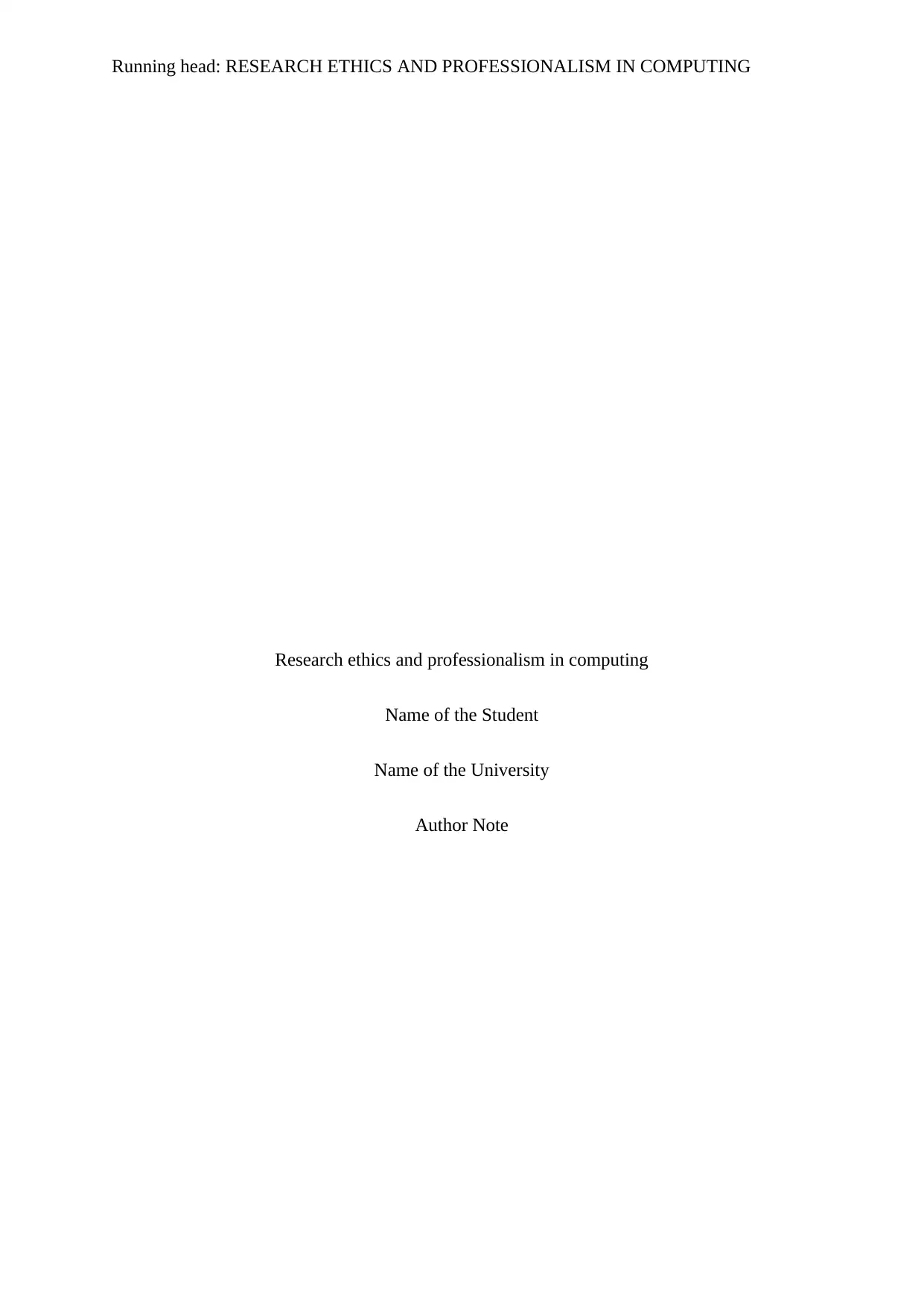
Running head: RESEARCH ETHICS AND PROFESSIONALISM IN COMPUTING
Research ethics and professionalism in computing
Name of the Student
Name of the University
Author Note
Research ethics and professionalism in computing
Name of the Student
Name of the University
Author Note
Paraphrase This Document
Need a fresh take? Get an instant paraphrase of this document with our AI Paraphraser
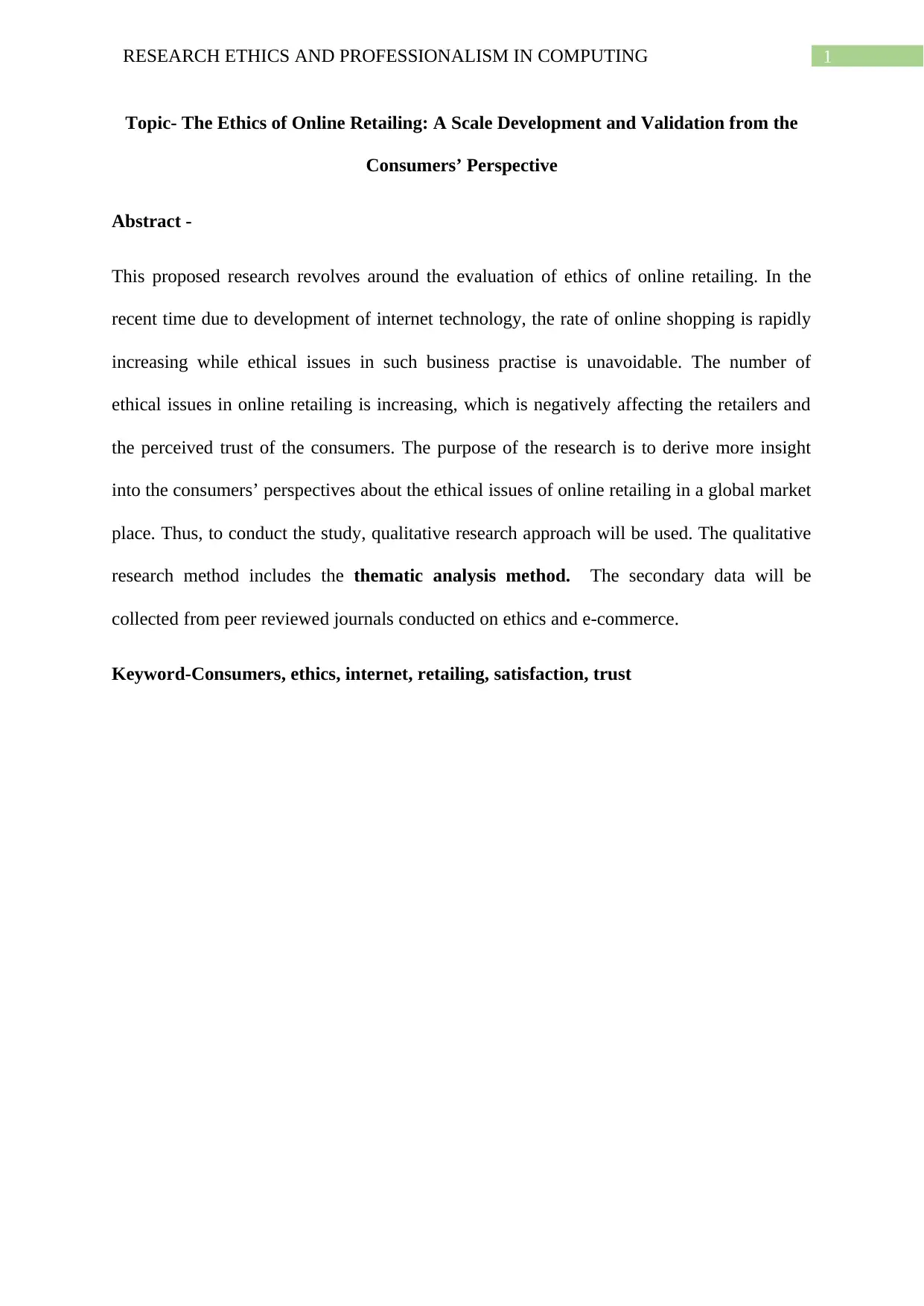
1RESEARCH ETHICS AND PROFESSIONALISM IN COMPUTING
Topic- The Ethics of Online Retailing: A Scale Development and Validation from the
Consumers’ Perspective
Abstract -
This proposed research revolves around the evaluation of ethics of online retailing. In the
recent time due to development of internet technology, the rate of online shopping is rapidly
increasing while ethical issues in such business practise is unavoidable. The number of
ethical issues in online retailing is increasing, which is negatively affecting the retailers and
the perceived trust of the consumers. The purpose of the research is to derive more insight
into the consumers’ perspectives about the ethical issues of online retailing in a global market
place. Thus, to conduct the study, qualitative research approach will be used. The qualitative
research method includes the thematic analysis method. The secondary data will be
collected from peer reviewed journals conducted on ethics and e-commerce.
Keyword-Consumers, ethics, internet, retailing, satisfaction, trust
Topic- The Ethics of Online Retailing: A Scale Development and Validation from the
Consumers’ Perspective
Abstract -
This proposed research revolves around the evaluation of ethics of online retailing. In the
recent time due to development of internet technology, the rate of online shopping is rapidly
increasing while ethical issues in such business practise is unavoidable. The number of
ethical issues in online retailing is increasing, which is negatively affecting the retailers and
the perceived trust of the consumers. The purpose of the research is to derive more insight
into the consumers’ perspectives about the ethical issues of online retailing in a global market
place. Thus, to conduct the study, qualitative research approach will be used. The qualitative
research method includes the thematic analysis method. The secondary data will be
collected from peer reviewed journals conducted on ethics and e-commerce.
Keyword-Consumers, ethics, internet, retailing, satisfaction, trust
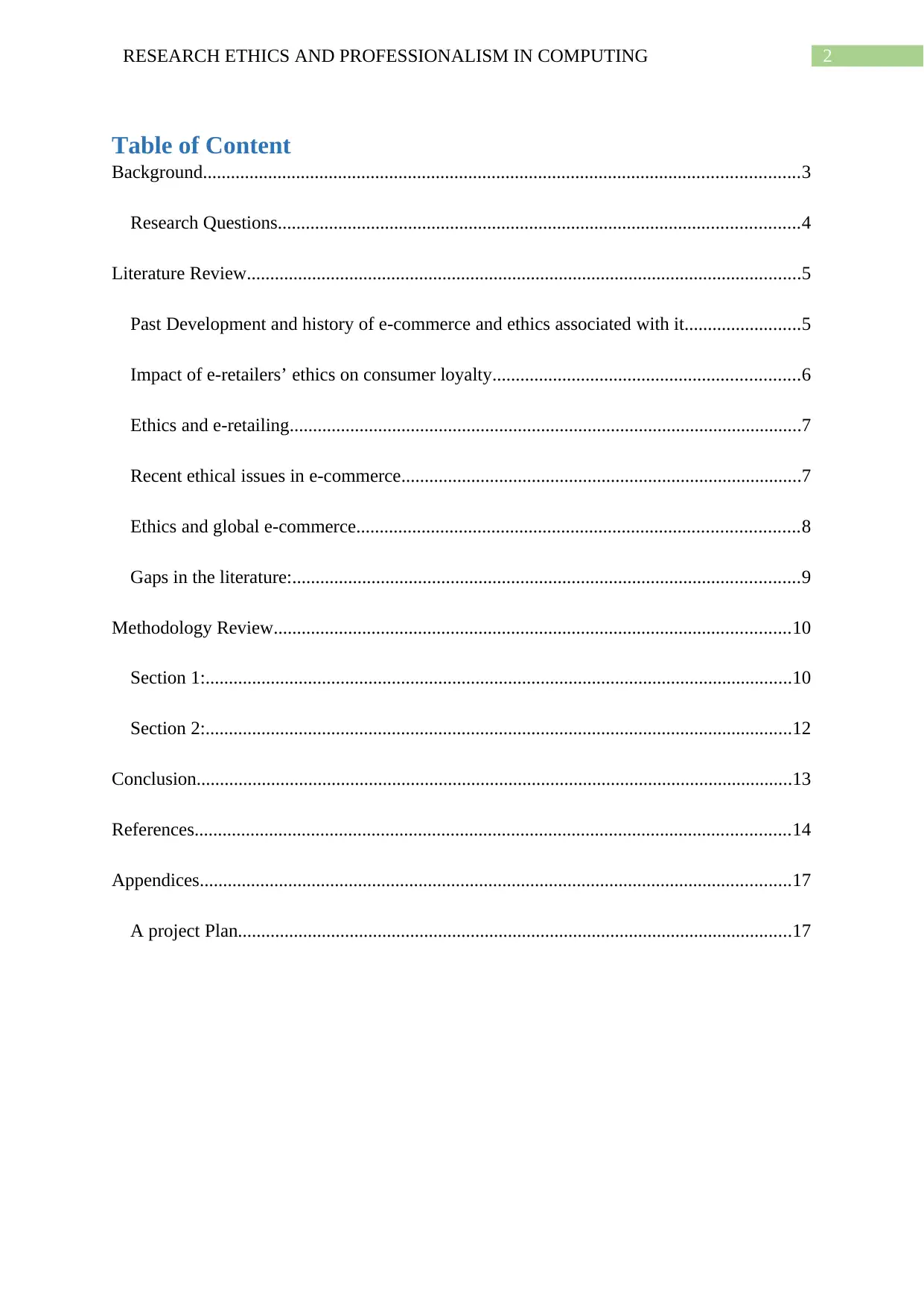
2RESEARCH ETHICS AND PROFESSIONALISM IN COMPUTING
Table of Content
Background................................................................................................................................3
Research Questions................................................................................................................4
Literature Review.......................................................................................................................5
Past Development and history of e-commerce and ethics associated with it.........................5
Impact of e-retailers’ ethics on consumer loyalty..................................................................6
Ethics and e-retailing..............................................................................................................7
Recent ethical issues in e-commerce......................................................................................7
Ethics and global e-commerce...............................................................................................8
Gaps in the literature:.............................................................................................................9
Methodology Review...............................................................................................................10
Section 1:..............................................................................................................................10
Section 2:..............................................................................................................................12
Conclusion................................................................................................................................13
References................................................................................................................................14
Appendices...............................................................................................................................17
A project Plan.......................................................................................................................17
Table of Content
Background................................................................................................................................3
Research Questions................................................................................................................4
Literature Review.......................................................................................................................5
Past Development and history of e-commerce and ethics associated with it.........................5
Impact of e-retailers’ ethics on consumer loyalty..................................................................6
Ethics and e-retailing..............................................................................................................7
Recent ethical issues in e-commerce......................................................................................7
Ethics and global e-commerce...............................................................................................8
Gaps in the literature:.............................................................................................................9
Methodology Review...............................................................................................................10
Section 1:..............................................................................................................................10
Section 2:..............................................................................................................................12
Conclusion................................................................................................................................13
References................................................................................................................................14
Appendices...............................................................................................................................17
A project Plan.......................................................................................................................17
⊘ This is a preview!⊘
Do you want full access?
Subscribe today to unlock all pages.

Trusted by 1+ million students worldwide
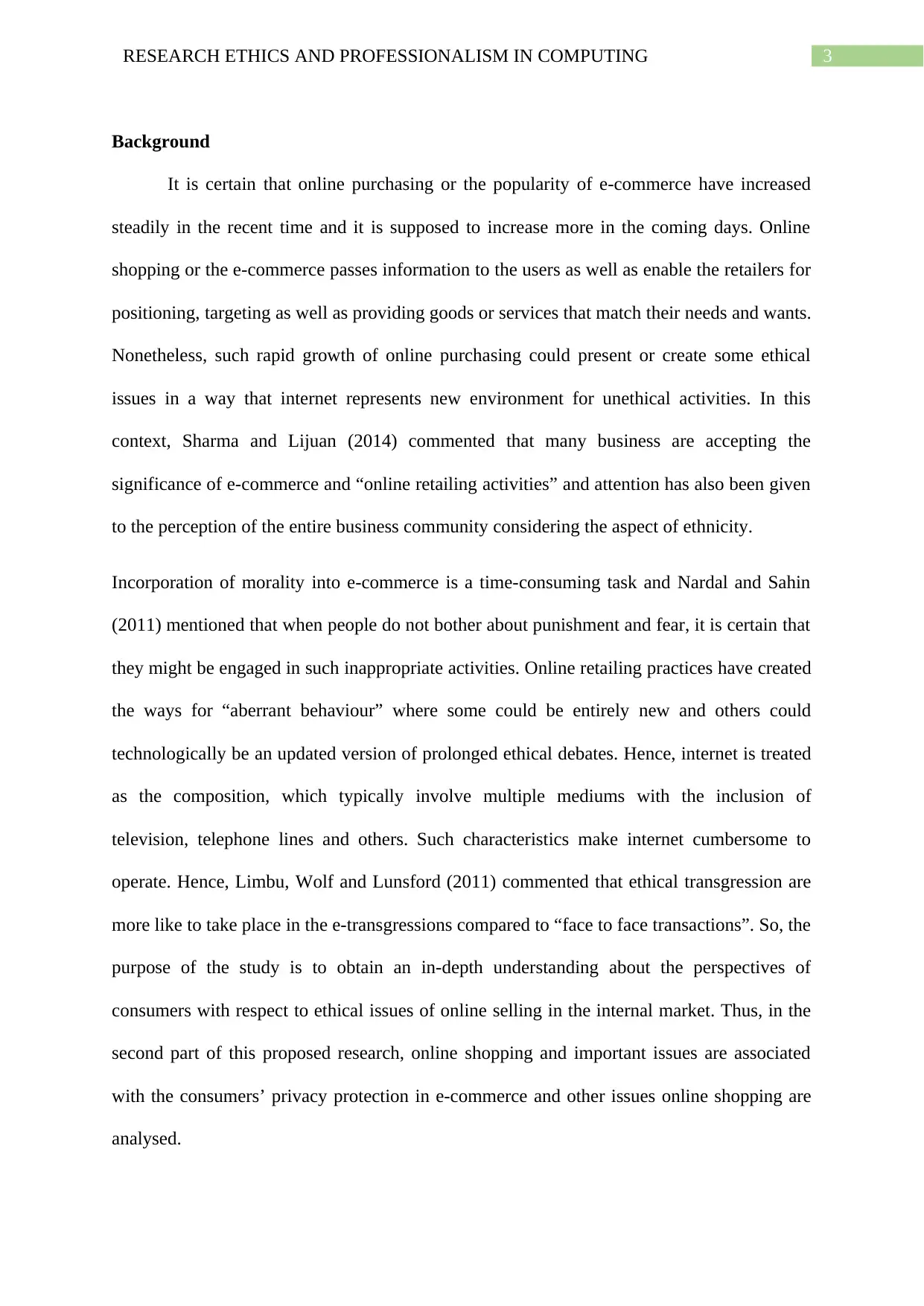
3RESEARCH ETHICS AND PROFESSIONALISM IN COMPUTING
Background
It is certain that online purchasing or the popularity of e-commerce have increased
steadily in the recent time and it is supposed to increase more in the coming days. Online
shopping or the e-commerce passes information to the users as well as enable the retailers for
positioning, targeting as well as providing goods or services that match their needs and wants.
Nonetheless, such rapid growth of online purchasing could present or create some ethical
issues in a way that internet represents new environment for unethical activities. In this
context, Sharma and Lijuan (2014) commented that many business are accepting the
significance of e-commerce and “online retailing activities” and attention has also been given
to the perception of the entire business community considering the aspect of ethnicity.
Incorporation of morality into e-commerce is a time-consuming task and Nardal and Sahin
(2011) mentioned that when people do not bother about punishment and fear, it is certain that
they might be engaged in such inappropriate activities. Online retailing practices have created
the ways for “aberrant behaviour” where some could be entirely new and others could
technologically be an updated version of prolonged ethical debates. Hence, internet is treated
as the composition, which typically involve multiple mediums with the inclusion of
television, telephone lines and others. Such characteristics make internet cumbersome to
operate. Hence, Limbu, Wolf and Lunsford (2011) commented that ethical transgression are
more like to take place in the e-transgressions compared to “face to face transactions”. So, the
purpose of the study is to obtain an in-depth understanding about the perspectives of
consumers with respect to ethical issues of online selling in the internal market. Thus, in the
second part of this proposed research, online shopping and important issues are associated
with the consumers’ privacy protection in e-commerce and other issues online shopping are
analysed.
Background
It is certain that online purchasing or the popularity of e-commerce have increased
steadily in the recent time and it is supposed to increase more in the coming days. Online
shopping or the e-commerce passes information to the users as well as enable the retailers for
positioning, targeting as well as providing goods or services that match their needs and wants.
Nonetheless, such rapid growth of online purchasing could present or create some ethical
issues in a way that internet represents new environment for unethical activities. In this
context, Sharma and Lijuan (2014) commented that many business are accepting the
significance of e-commerce and “online retailing activities” and attention has also been given
to the perception of the entire business community considering the aspect of ethnicity.
Incorporation of morality into e-commerce is a time-consuming task and Nardal and Sahin
(2011) mentioned that when people do not bother about punishment and fear, it is certain that
they might be engaged in such inappropriate activities. Online retailing practices have created
the ways for “aberrant behaviour” where some could be entirely new and others could
technologically be an updated version of prolonged ethical debates. Hence, internet is treated
as the composition, which typically involve multiple mediums with the inclusion of
television, telephone lines and others. Such characteristics make internet cumbersome to
operate. Hence, Limbu, Wolf and Lunsford (2011) commented that ethical transgression are
more like to take place in the e-transgressions compared to “face to face transactions”. So, the
purpose of the study is to obtain an in-depth understanding about the perspectives of
consumers with respect to ethical issues of online selling in the internal market. Thus, in the
second part of this proposed research, online shopping and important issues are associated
with the consumers’ privacy protection in e-commerce and other issues online shopping are
analysed.
Paraphrase This Document
Need a fresh take? Get an instant paraphrase of this document with our AI Paraphraser
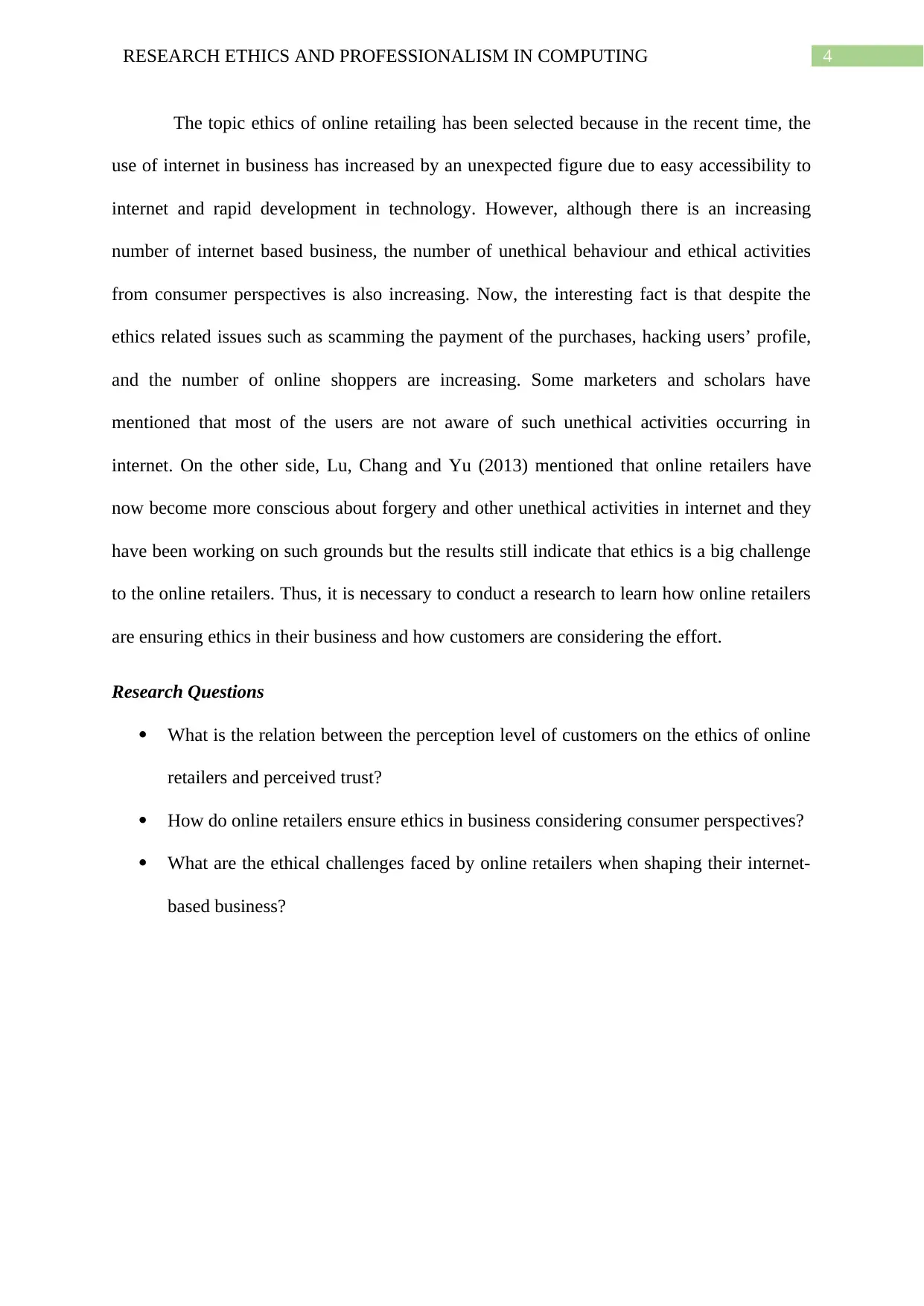
4RESEARCH ETHICS AND PROFESSIONALISM IN COMPUTING
The topic ethics of online retailing has been selected because in the recent time, the
use of internet in business has increased by an unexpected figure due to easy accessibility to
internet and rapid development in technology. However, although there is an increasing
number of internet based business, the number of unethical behaviour and ethical activities
from consumer perspectives is also increasing. Now, the interesting fact is that despite the
ethics related issues such as scamming the payment of the purchases, hacking users’ profile,
and the number of online shoppers are increasing. Some marketers and scholars have
mentioned that most of the users are not aware of such unethical activities occurring in
internet. On the other side, Lu, Chang and Yu (2013) mentioned that online retailers have
now become more conscious about forgery and other unethical activities in internet and they
have been working on such grounds but the results still indicate that ethics is a big challenge
to the online retailers. Thus, it is necessary to conduct a research to learn how online retailers
are ensuring ethics in their business and how customers are considering the effort.
Research Questions
What is the relation between the perception level of customers on the ethics of online
retailers and perceived trust?
How do online retailers ensure ethics in business considering consumer perspectives?
What are the ethical challenges faced by online retailers when shaping their internet-
based business?
The topic ethics of online retailing has been selected because in the recent time, the
use of internet in business has increased by an unexpected figure due to easy accessibility to
internet and rapid development in technology. However, although there is an increasing
number of internet based business, the number of unethical behaviour and ethical activities
from consumer perspectives is also increasing. Now, the interesting fact is that despite the
ethics related issues such as scamming the payment of the purchases, hacking users’ profile,
and the number of online shoppers are increasing. Some marketers and scholars have
mentioned that most of the users are not aware of such unethical activities occurring in
internet. On the other side, Lu, Chang and Yu (2013) mentioned that online retailers have
now become more conscious about forgery and other unethical activities in internet and they
have been working on such grounds but the results still indicate that ethics is a big challenge
to the online retailers. Thus, it is necessary to conduct a research to learn how online retailers
are ensuring ethics in their business and how customers are considering the effort.
Research Questions
What is the relation between the perception level of customers on the ethics of online
retailers and perceived trust?
How do online retailers ensure ethics in business considering consumer perspectives?
What are the ethical challenges faced by online retailers when shaping their internet-
based business?
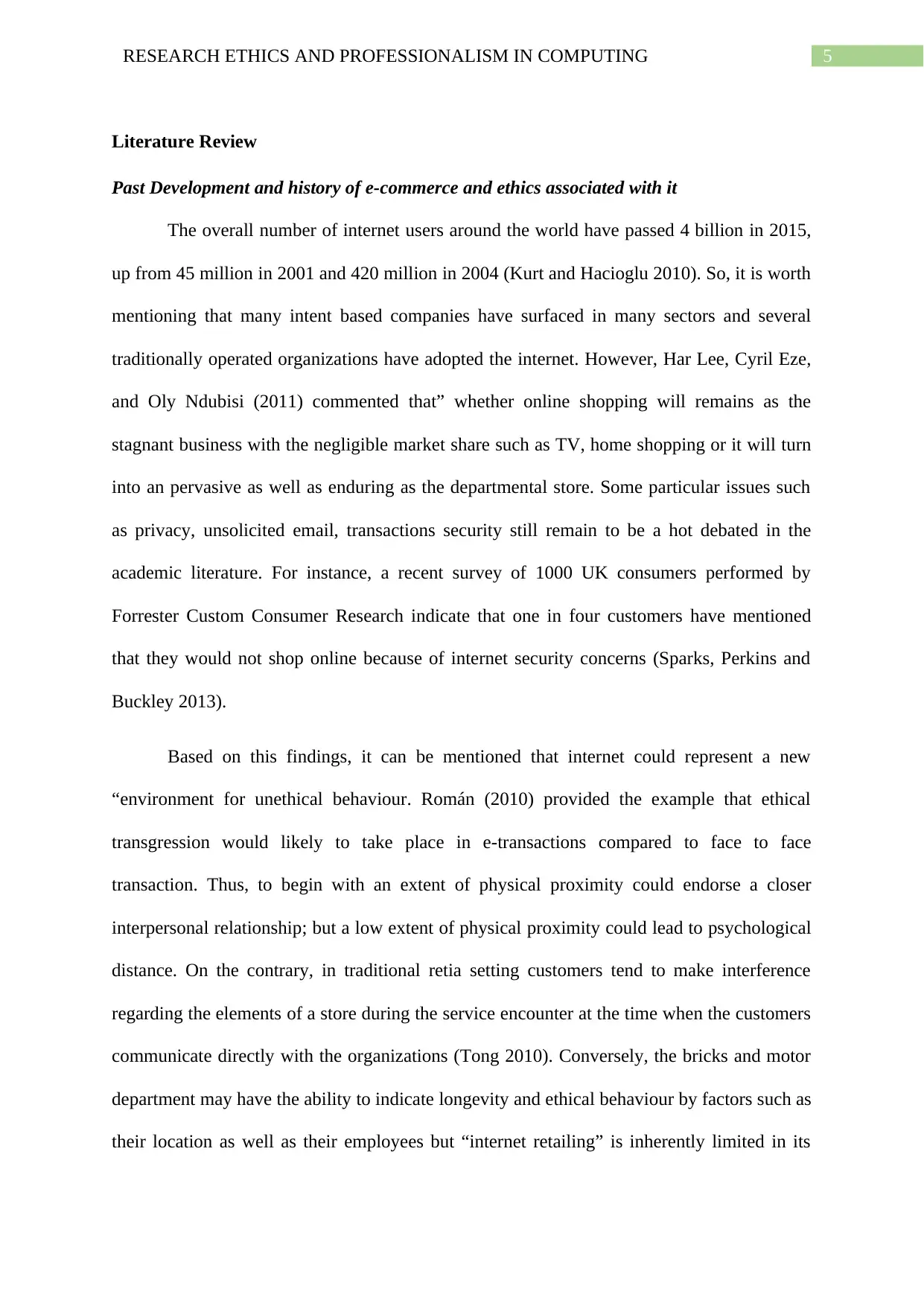
5RESEARCH ETHICS AND PROFESSIONALISM IN COMPUTING
Literature Review
Past Development and history of e-commerce and ethics associated with it
The overall number of internet users around the world have passed 4 billion in 2015,
up from 45 million in 2001 and 420 million in 2004 (Kurt and Hacioglu 2010). So, it is worth
mentioning that many intent based companies have surfaced in many sectors and several
traditionally operated organizations have adopted the internet. However, Har Lee, Cyril Eze,
and Oly Ndubisi (2011) commented that” whether online shopping will remains as the
stagnant business with the negligible market share such as TV, home shopping or it will turn
into an pervasive as well as enduring as the departmental store. Some particular issues such
as privacy, unsolicited email, transactions security still remain to be a hot debated in the
academic literature. For instance, a recent survey of 1000 UK consumers performed by
Forrester Custom Consumer Research indicate that one in four customers have mentioned
that they would not shop online because of internet security concerns (Sparks, Perkins and
Buckley 2013).
Based on this findings, it can be mentioned that internet could represent a new
“environment for unethical behaviour. Román (2010) provided the example that ethical
transgression would likely to take place in e-transactions compared to face to face
transaction. Thus, to begin with an extent of physical proximity could endorse a closer
interpersonal relationship; but a low extent of physical proximity could lead to psychological
distance. On the contrary, in traditional retia setting customers tend to make interference
regarding the elements of a store during the service encounter at the time when the customers
communicate directly with the organizations (Tong 2010). Conversely, the bricks and motor
department may have the ability to indicate longevity and ethical behaviour by factors such as
their location as well as their employees but “internet retailing” is inherently limited in its
Literature Review
Past Development and history of e-commerce and ethics associated with it
The overall number of internet users around the world have passed 4 billion in 2015,
up from 45 million in 2001 and 420 million in 2004 (Kurt and Hacioglu 2010). So, it is worth
mentioning that many intent based companies have surfaced in many sectors and several
traditionally operated organizations have adopted the internet. However, Har Lee, Cyril Eze,
and Oly Ndubisi (2011) commented that” whether online shopping will remains as the
stagnant business with the negligible market share such as TV, home shopping or it will turn
into an pervasive as well as enduring as the departmental store. Some particular issues such
as privacy, unsolicited email, transactions security still remain to be a hot debated in the
academic literature. For instance, a recent survey of 1000 UK consumers performed by
Forrester Custom Consumer Research indicate that one in four customers have mentioned
that they would not shop online because of internet security concerns (Sparks, Perkins and
Buckley 2013).
Based on this findings, it can be mentioned that internet could represent a new
“environment for unethical behaviour. Román (2010) provided the example that ethical
transgression would likely to take place in e-transactions compared to face to face
transaction. Thus, to begin with an extent of physical proximity could endorse a closer
interpersonal relationship; but a low extent of physical proximity could lead to psychological
distance. On the contrary, in traditional retia setting customers tend to make interference
regarding the elements of a store during the service encounter at the time when the customers
communicate directly with the organizations (Tong 2010). Conversely, the bricks and motor
department may have the ability to indicate longevity and ethical behaviour by factors such as
their location as well as their employees but “internet retailing” is inherently limited in its
⊘ This is a preview!⊘
Do you want full access?
Subscribe today to unlock all pages.

Trusted by 1+ million students worldwide
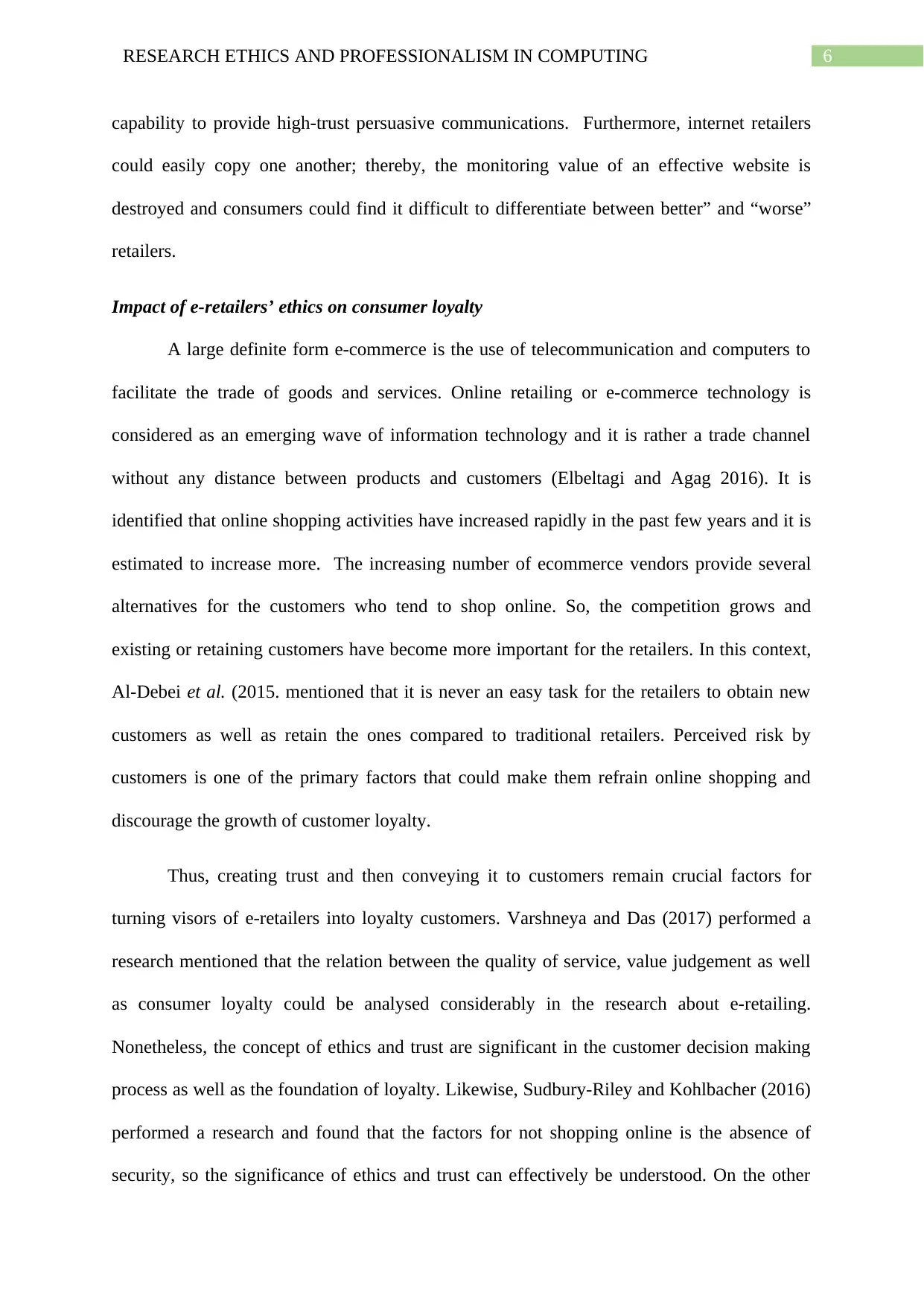
6RESEARCH ETHICS AND PROFESSIONALISM IN COMPUTING
capability to provide high-trust persuasive communications. Furthermore, internet retailers
could easily copy one another; thereby, the monitoring value of an effective website is
destroyed and consumers could find it difficult to differentiate between better” and “worse”
retailers.
Impact of e-retailers’ ethics on consumer loyalty
A large definite form e-commerce is the use of telecommunication and computers to
facilitate the trade of goods and services. Online retailing or e-commerce technology is
considered as an emerging wave of information technology and it is rather a trade channel
without any distance between products and customers (Elbeltagi and Agag 2016). It is
identified that online shopping activities have increased rapidly in the past few years and it is
estimated to increase more. The increasing number of ecommerce vendors provide several
alternatives for the customers who tend to shop online. So, the competition grows and
existing or retaining customers have become more important for the retailers. In this context,
Al-Debei et al. (2015. mentioned that it is never an easy task for the retailers to obtain new
customers as well as retain the ones compared to traditional retailers. Perceived risk by
customers is one of the primary factors that could make them refrain online shopping and
discourage the growth of customer loyalty.
Thus, creating trust and then conveying it to customers remain crucial factors for
turning visors of e-retailers into loyalty customers. Varshneya and Das (2017) performed a
research mentioned that the relation between the quality of service, value judgement as well
as consumer loyalty could be analysed considerably in the research about e-retailing.
Nonetheless, the concept of ethics and trust are significant in the customer decision making
process as well as the foundation of loyalty. Likewise, Sudbury-Riley and Kohlbacher (2016)
performed a research and found that the factors for not shopping online is the absence of
security, so the significance of ethics and trust can effectively be understood. On the other
capability to provide high-trust persuasive communications. Furthermore, internet retailers
could easily copy one another; thereby, the monitoring value of an effective website is
destroyed and consumers could find it difficult to differentiate between better” and “worse”
retailers.
Impact of e-retailers’ ethics on consumer loyalty
A large definite form e-commerce is the use of telecommunication and computers to
facilitate the trade of goods and services. Online retailing or e-commerce technology is
considered as an emerging wave of information technology and it is rather a trade channel
without any distance between products and customers (Elbeltagi and Agag 2016). It is
identified that online shopping activities have increased rapidly in the past few years and it is
estimated to increase more. The increasing number of ecommerce vendors provide several
alternatives for the customers who tend to shop online. So, the competition grows and
existing or retaining customers have become more important for the retailers. In this context,
Al-Debei et al. (2015. mentioned that it is never an easy task for the retailers to obtain new
customers as well as retain the ones compared to traditional retailers. Perceived risk by
customers is one of the primary factors that could make them refrain online shopping and
discourage the growth of customer loyalty.
Thus, creating trust and then conveying it to customers remain crucial factors for
turning visors of e-retailers into loyalty customers. Varshneya and Das (2017) performed a
research mentioned that the relation between the quality of service, value judgement as well
as consumer loyalty could be analysed considerably in the research about e-retailing.
Nonetheless, the concept of ethics and trust are significant in the customer decision making
process as well as the foundation of loyalty. Likewise, Sudbury-Riley and Kohlbacher (2016)
performed a research and found that the factors for not shopping online is the absence of
security, so the significance of ethics and trust can effectively be understood. On the other
Paraphrase This Document
Need a fresh take? Get an instant paraphrase of this document with our AI Paraphraser
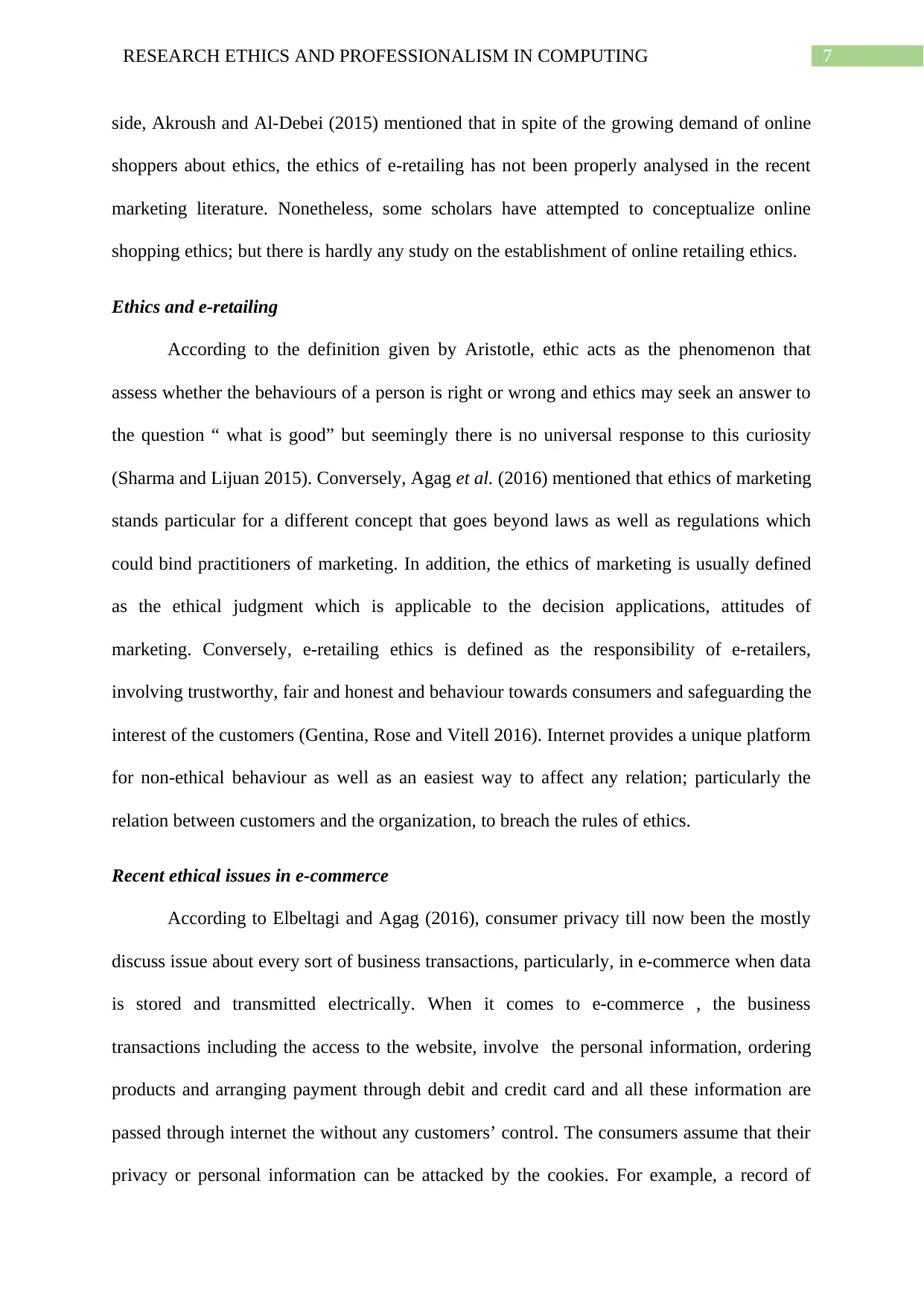
7RESEARCH ETHICS AND PROFESSIONALISM IN COMPUTING
side, Akroush and Al-Debei (2015) mentioned that in spite of the growing demand of online
shoppers about ethics, the ethics of e-retailing has not been properly analysed in the recent
marketing literature. Nonetheless, some scholars have attempted to conceptualize online
shopping ethics; but there is hardly any study on the establishment of online retailing ethics.
Ethics and e-retailing
According to the definition given by Aristotle, ethic acts as the phenomenon that
assess whether the behaviours of a person is right or wrong and ethics may seek an answer to
the question “ what is good” but seemingly there is no universal response to this curiosity
(Sharma and Lijuan 2015). Conversely, Agag et al. (2016) mentioned that ethics of marketing
stands particular for a different concept that goes beyond laws as well as regulations which
could bind practitioners of marketing. In addition, the ethics of marketing is usually defined
as the ethical judgment which is applicable to the decision applications, attitudes of
marketing. Conversely, e-retailing ethics is defined as the responsibility of e-retailers,
involving trustworthy, fair and honest and behaviour towards consumers and safeguarding the
interest of the customers (Gentina, Rose and Vitell 2016). Internet provides a unique platform
for non-ethical behaviour as well as an easiest way to affect any relation; particularly the
relation between customers and the organization, to breach the rules of ethics.
Recent ethical issues in e-commerce
According to Elbeltagi and Agag (2016), consumer privacy till now been the mostly
discuss issue about every sort of business transactions, particularly, in e-commerce when data
is stored and transmitted electrically. When it comes to e-commerce , the business
transactions including the access to the website, involve the personal information, ordering
products and arranging payment through debit and credit card and all these information are
passed through internet the without any customers’ control. The consumers assume that their
privacy or personal information can be attacked by the cookies. For example, a record of
side, Akroush and Al-Debei (2015) mentioned that in spite of the growing demand of online
shoppers about ethics, the ethics of e-retailing has not been properly analysed in the recent
marketing literature. Nonetheless, some scholars have attempted to conceptualize online
shopping ethics; but there is hardly any study on the establishment of online retailing ethics.
Ethics and e-retailing
According to the definition given by Aristotle, ethic acts as the phenomenon that
assess whether the behaviours of a person is right or wrong and ethics may seek an answer to
the question “ what is good” but seemingly there is no universal response to this curiosity
(Sharma and Lijuan 2015). Conversely, Agag et al. (2016) mentioned that ethics of marketing
stands particular for a different concept that goes beyond laws as well as regulations which
could bind practitioners of marketing. In addition, the ethics of marketing is usually defined
as the ethical judgment which is applicable to the decision applications, attitudes of
marketing. Conversely, e-retailing ethics is defined as the responsibility of e-retailers,
involving trustworthy, fair and honest and behaviour towards consumers and safeguarding the
interest of the customers (Gentina, Rose and Vitell 2016). Internet provides a unique platform
for non-ethical behaviour as well as an easiest way to affect any relation; particularly the
relation between customers and the organization, to breach the rules of ethics.
Recent ethical issues in e-commerce
According to Elbeltagi and Agag (2016), consumer privacy till now been the mostly
discuss issue about every sort of business transactions, particularly, in e-commerce when data
is stored and transmitted electrically. When it comes to e-commerce , the business
transactions including the access to the website, involve the personal information, ordering
products and arranging payment through debit and credit card and all these information are
passed through internet the without any customers’ control. The consumers assume that their
privacy or personal information can be attacked by the cookies. For example, a record of
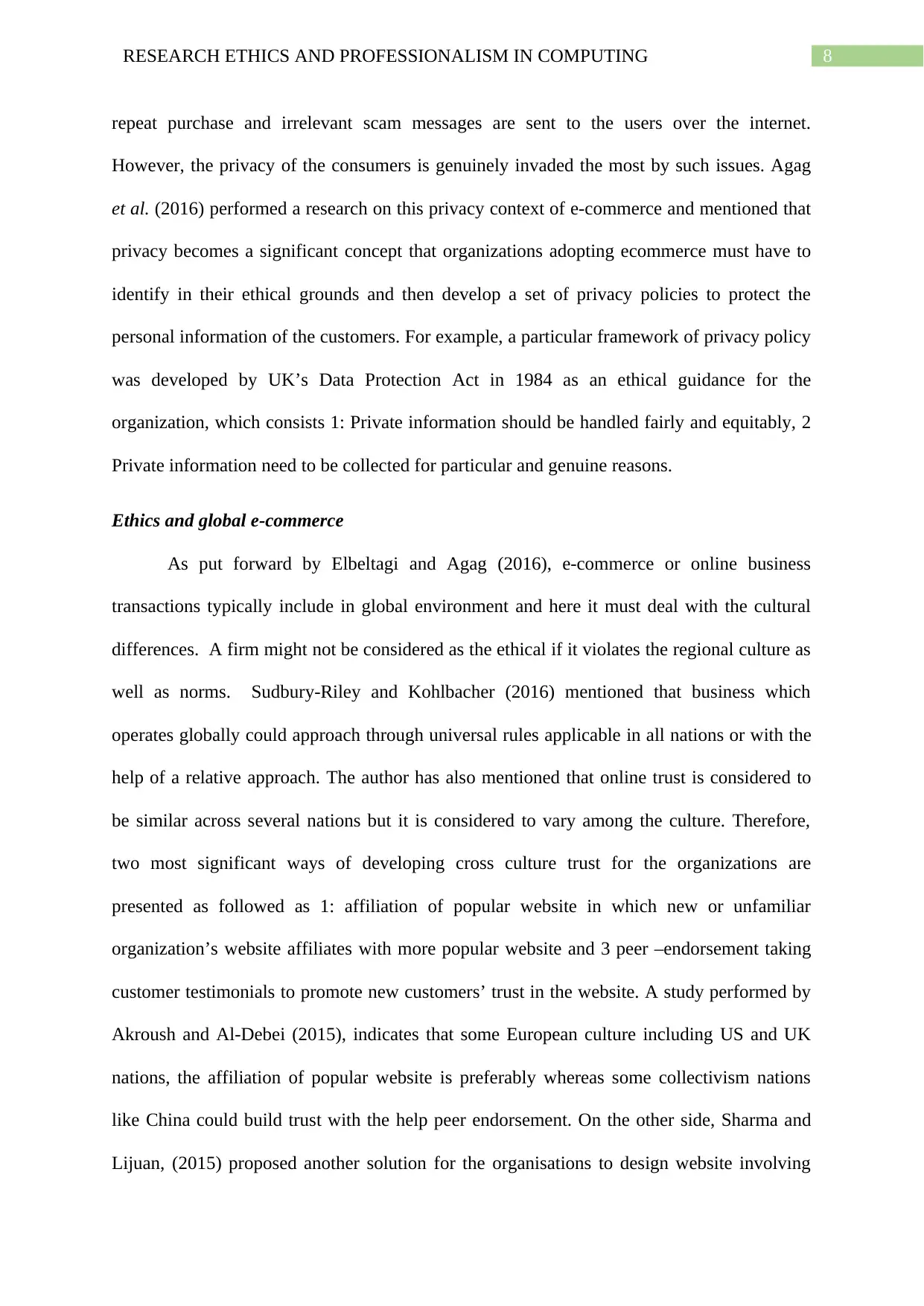
8RESEARCH ETHICS AND PROFESSIONALISM IN COMPUTING
repeat purchase and irrelevant scam messages are sent to the users over the internet.
However, the privacy of the consumers is genuinely invaded the most by such issues. Agag
et al. (2016) performed a research on this privacy context of e-commerce and mentioned that
privacy becomes a significant concept that organizations adopting ecommerce must have to
identify in their ethical grounds and then develop a set of privacy policies to protect the
personal information of the customers. For example, a particular framework of privacy policy
was developed by UK’s Data Protection Act in 1984 as an ethical guidance for the
organization, which consists 1: Private information should be handled fairly and equitably, 2
Private information need to be collected for particular and genuine reasons.
Ethics and global e-commerce
As put forward by Elbeltagi and Agag (2016), e-commerce or online business
transactions typically include in global environment and here it must deal with the cultural
differences. A firm might not be considered as the ethical if it violates the regional culture as
well as norms. Sudbury-Riley and Kohlbacher (2016) mentioned that business which
operates globally could approach through universal rules applicable in all nations or with the
help of a relative approach. The author has also mentioned that online trust is considered to
be similar across several nations but it is considered to vary among the culture. Therefore,
two most significant ways of developing cross culture trust for the organizations are
presented as followed as 1: affiliation of popular website in which new or unfamiliar
organization’s website affiliates with more popular website and 3 peer –endorsement taking
customer testimonials to promote new customers’ trust in the website. A study performed by
Akroush and Al-Debei (2015), indicates that some European culture including US and UK
nations, the affiliation of popular website is preferably whereas some collectivism nations
like China could build trust with the help peer endorsement. On the other side, Sharma and
Lijuan, (2015) proposed another solution for the organisations to design website involving
repeat purchase and irrelevant scam messages are sent to the users over the internet.
However, the privacy of the consumers is genuinely invaded the most by such issues. Agag
et al. (2016) performed a research on this privacy context of e-commerce and mentioned that
privacy becomes a significant concept that organizations adopting ecommerce must have to
identify in their ethical grounds and then develop a set of privacy policies to protect the
personal information of the customers. For example, a particular framework of privacy policy
was developed by UK’s Data Protection Act in 1984 as an ethical guidance for the
organization, which consists 1: Private information should be handled fairly and equitably, 2
Private information need to be collected for particular and genuine reasons.
Ethics and global e-commerce
As put forward by Elbeltagi and Agag (2016), e-commerce or online business
transactions typically include in global environment and here it must deal with the cultural
differences. A firm might not be considered as the ethical if it violates the regional culture as
well as norms. Sudbury-Riley and Kohlbacher (2016) mentioned that business which
operates globally could approach through universal rules applicable in all nations or with the
help of a relative approach. The author has also mentioned that online trust is considered to
be similar across several nations but it is considered to vary among the culture. Therefore,
two most significant ways of developing cross culture trust for the organizations are
presented as followed as 1: affiliation of popular website in which new or unfamiliar
organization’s website affiliates with more popular website and 3 peer –endorsement taking
customer testimonials to promote new customers’ trust in the website. A study performed by
Akroush and Al-Debei (2015), indicates that some European culture including US and UK
nations, the affiliation of popular website is preferably whereas some collectivism nations
like China could build trust with the help peer endorsement. On the other side, Sharma and
Lijuan, (2015) proposed another solution for the organisations to design website involving
⊘ This is a preview!⊘
Do you want full access?
Subscribe today to unlock all pages.

Trusted by 1+ million students worldwide
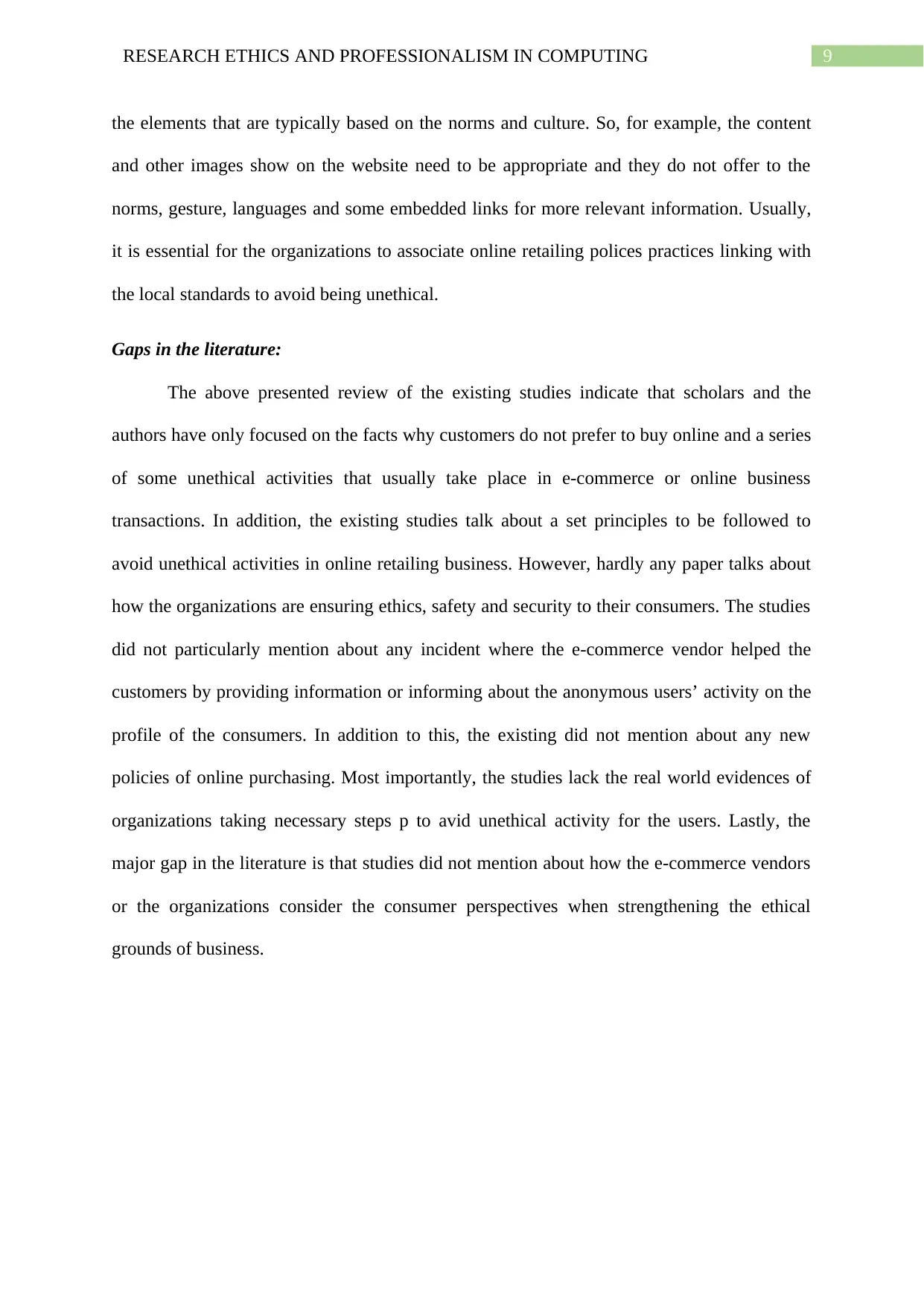
9RESEARCH ETHICS AND PROFESSIONALISM IN COMPUTING
the elements that are typically based on the norms and culture. So, for example, the content
and other images show on the website need to be appropriate and they do not offer to the
norms, gesture, languages and some embedded links for more relevant information. Usually,
it is essential for the organizations to associate online retailing polices practices linking with
the local standards to avoid being unethical.
Gaps in the literature:
The above presented review of the existing studies indicate that scholars and the
authors have only focused on the facts why customers do not prefer to buy online and a series
of some unethical activities that usually take place in e-commerce or online business
transactions. In addition, the existing studies talk about a set principles to be followed to
avoid unethical activities in online retailing business. However, hardly any paper talks about
how the organizations are ensuring ethics, safety and security to their consumers. The studies
did not particularly mention about any incident where the e-commerce vendor helped the
customers by providing information or informing about the anonymous users’ activity on the
profile of the consumers. In addition to this, the existing did not mention about any new
policies of online purchasing. Most importantly, the studies lack the real world evidences of
organizations taking necessary steps p to avid unethical activity for the users. Lastly, the
major gap in the literature is that studies did not mention about how the e-commerce vendors
or the organizations consider the consumer perspectives when strengthening the ethical
grounds of business.
the elements that are typically based on the norms and culture. So, for example, the content
and other images show on the website need to be appropriate and they do not offer to the
norms, gesture, languages and some embedded links for more relevant information. Usually,
it is essential for the organizations to associate online retailing polices practices linking with
the local standards to avoid being unethical.
Gaps in the literature:
The above presented review of the existing studies indicate that scholars and the
authors have only focused on the facts why customers do not prefer to buy online and a series
of some unethical activities that usually take place in e-commerce or online business
transactions. In addition, the existing studies talk about a set principles to be followed to
avoid unethical activities in online retailing business. However, hardly any paper talks about
how the organizations are ensuring ethics, safety and security to their consumers. The studies
did not particularly mention about any incident where the e-commerce vendor helped the
customers by providing information or informing about the anonymous users’ activity on the
profile of the consumers. In addition to this, the existing did not mention about any new
policies of online purchasing. Most importantly, the studies lack the real world evidences of
organizations taking necessary steps p to avid unethical activity for the users. Lastly, the
major gap in the literature is that studies did not mention about how the e-commerce vendors
or the organizations consider the consumer perspectives when strengthening the ethical
grounds of business.
Paraphrase This Document
Need a fresh take? Get an instant paraphrase of this document with our AI Paraphraser
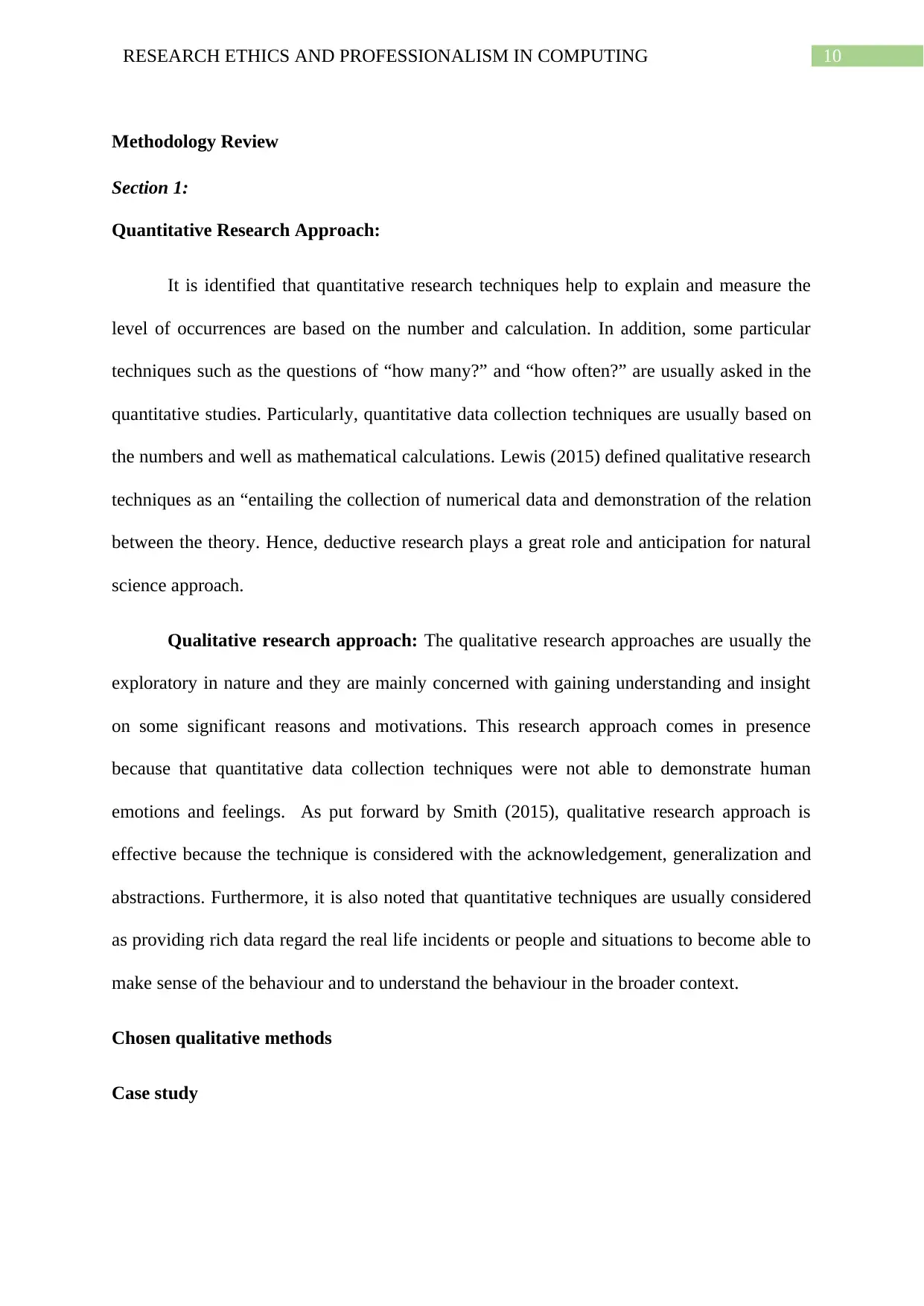
10RESEARCH ETHICS AND PROFESSIONALISM IN COMPUTING
Methodology Review
Section 1:
Quantitative Research Approach:
It is identified that quantitative research techniques help to explain and measure the
level of occurrences are based on the number and calculation. In addition, some particular
techniques such as the questions of “how many?” and “how often?” are usually asked in the
quantitative studies. Particularly, quantitative data collection techniques are usually based on
the numbers and well as mathematical calculations. Lewis (2015) defined qualitative research
techniques as an “entailing the collection of numerical data and demonstration of the relation
between the theory. Hence, deductive research plays a great role and anticipation for natural
science approach.
Qualitative research approach: The qualitative research approaches are usually the
exploratory in nature and they are mainly concerned with gaining understanding and insight
on some significant reasons and motivations. This research approach comes in presence
because that quantitative data collection techniques were not able to demonstrate human
emotions and feelings. As put forward by Smith (2015), qualitative research approach is
effective because the technique is considered with the acknowledgement, generalization and
abstractions. Furthermore, it is also noted that quantitative techniques are usually considered
as providing rich data regard the real life incidents or people and situations to become able to
make sense of the behaviour and to understand the behaviour in the broader context.
Chosen qualitative methods
Case study
Methodology Review
Section 1:
Quantitative Research Approach:
It is identified that quantitative research techniques help to explain and measure the
level of occurrences are based on the number and calculation. In addition, some particular
techniques such as the questions of “how many?” and “how often?” are usually asked in the
quantitative studies. Particularly, quantitative data collection techniques are usually based on
the numbers and well as mathematical calculations. Lewis (2015) defined qualitative research
techniques as an “entailing the collection of numerical data and demonstration of the relation
between the theory. Hence, deductive research plays a great role and anticipation for natural
science approach.
Qualitative research approach: The qualitative research approaches are usually the
exploratory in nature and they are mainly concerned with gaining understanding and insight
on some significant reasons and motivations. This research approach comes in presence
because that quantitative data collection techniques were not able to demonstrate human
emotions and feelings. As put forward by Smith (2015), qualitative research approach is
effective because the technique is considered with the acknowledgement, generalization and
abstractions. Furthermore, it is also noted that quantitative techniques are usually considered
as providing rich data regard the real life incidents or people and situations to become able to
make sense of the behaviour and to understand the behaviour in the broader context.
Chosen qualitative methods
Case study
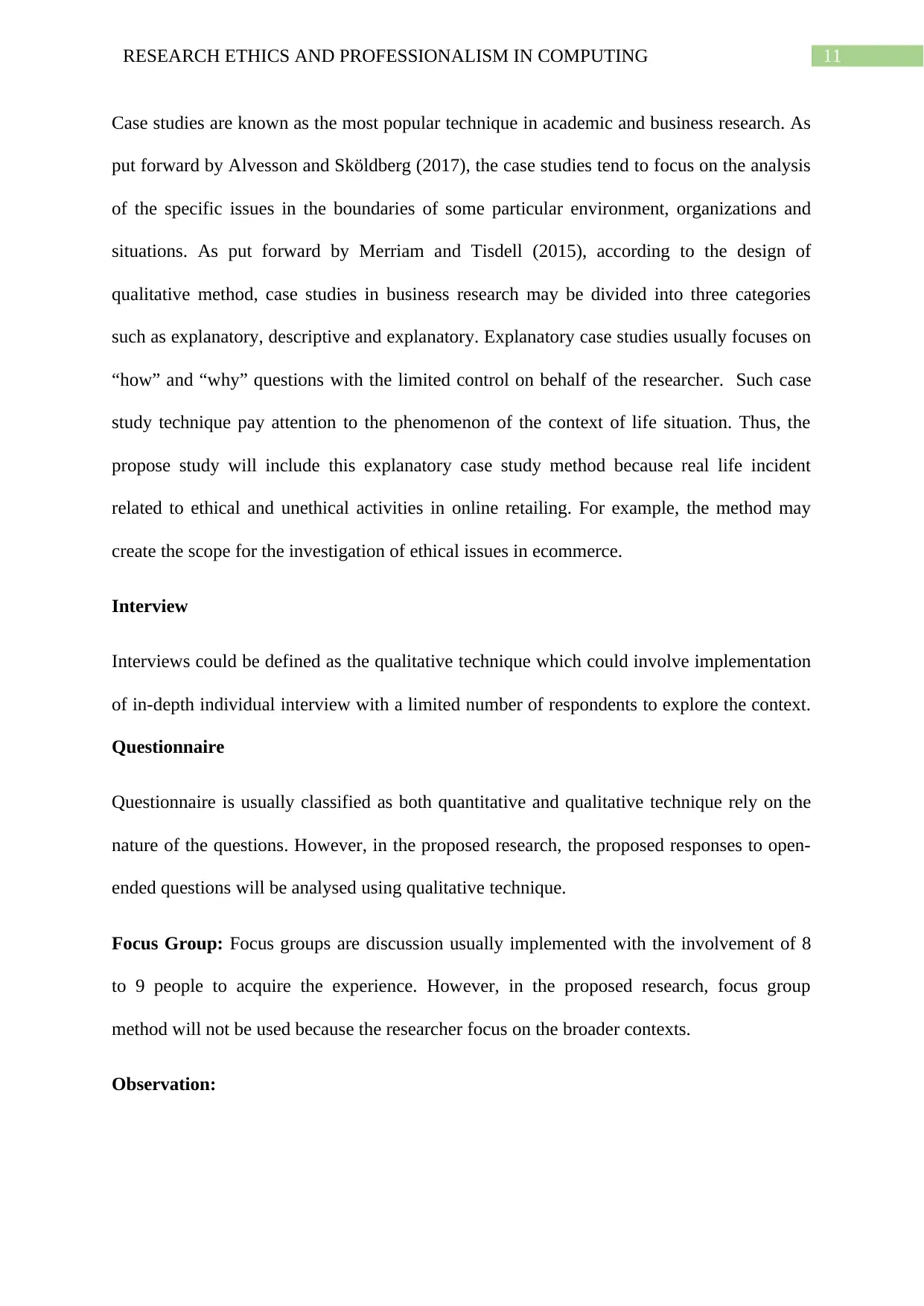
11RESEARCH ETHICS AND PROFESSIONALISM IN COMPUTING
Case studies are known as the most popular technique in academic and business research. As
put forward by Alvesson and Sköldberg (2017), the case studies tend to focus on the analysis
of the specific issues in the boundaries of some particular environment, organizations and
situations. As put forward by Merriam and Tisdell (2015), according to the design of
qualitative method, case studies in business research may be divided into three categories
such as explanatory, descriptive and explanatory. Explanatory case studies usually focuses on
“how” and “why” questions with the limited control on behalf of the researcher. Such case
study technique pay attention to the phenomenon of the context of life situation. Thus, the
propose study will include this explanatory case study method because real life incident
related to ethical and unethical activities in online retailing. For example, the method may
create the scope for the investigation of ethical issues in ecommerce.
Interview
Interviews could be defined as the qualitative technique which could involve implementation
of in-depth individual interview with a limited number of respondents to explore the context.
Questionnaire
Questionnaire is usually classified as both quantitative and qualitative technique rely on the
nature of the questions. However, in the proposed research, the proposed responses to open-
ended questions will be analysed using qualitative technique.
Focus Group: Focus groups are discussion usually implemented with the involvement of 8
to 9 people to acquire the experience. However, in the proposed research, focus group
method will not be used because the researcher focus on the broader contexts.
Observation:
Case studies are known as the most popular technique in academic and business research. As
put forward by Alvesson and Sköldberg (2017), the case studies tend to focus on the analysis
of the specific issues in the boundaries of some particular environment, organizations and
situations. As put forward by Merriam and Tisdell (2015), according to the design of
qualitative method, case studies in business research may be divided into three categories
such as explanatory, descriptive and explanatory. Explanatory case studies usually focuses on
“how” and “why” questions with the limited control on behalf of the researcher. Such case
study technique pay attention to the phenomenon of the context of life situation. Thus, the
propose study will include this explanatory case study method because real life incident
related to ethical and unethical activities in online retailing. For example, the method may
create the scope for the investigation of ethical issues in ecommerce.
Interview
Interviews could be defined as the qualitative technique which could involve implementation
of in-depth individual interview with a limited number of respondents to explore the context.
Questionnaire
Questionnaire is usually classified as both quantitative and qualitative technique rely on the
nature of the questions. However, in the proposed research, the proposed responses to open-
ended questions will be analysed using qualitative technique.
Focus Group: Focus groups are discussion usually implemented with the involvement of 8
to 9 people to acquire the experience. However, in the proposed research, focus group
method will not be used because the researcher focus on the broader contexts.
Observation:
⊘ This is a preview!⊘
Do you want full access?
Subscribe today to unlock all pages.

Trusted by 1+ million students worldwide
1 out of 18
Related Documents
Your All-in-One AI-Powered Toolkit for Academic Success.
+13062052269
info@desklib.com
Available 24*7 on WhatsApp / Email
![[object Object]](/_next/static/media/star-bottom.7253800d.svg)
Unlock your academic potential
Copyright © 2020–2026 A2Z Services. All Rights Reserved. Developed and managed by ZUCOL.





